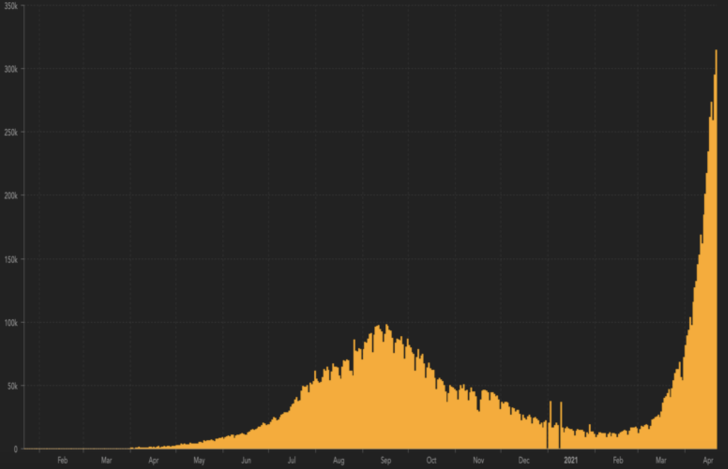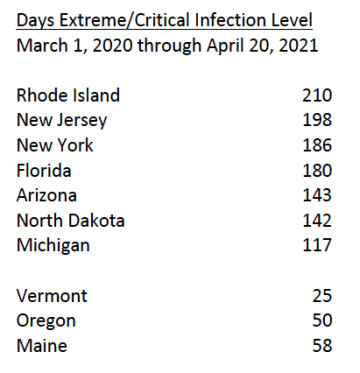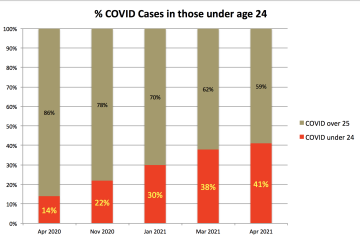76% of COVID Cases in RI Now Due to Variants – and Vaccines Alone Might Not Protect Us
Friday, April 23, 2021
Governor Dan McKee's announcement of speeding up the removal of restrictions is a big bet at a time that variants are dominating.
COVID variants continue to grow as a proportion of total cases in Rhode Island. Data released on Monday by RIDOH showed that variants now account for 84% of positive cases recently sequenced, and 76% of cases in data reported Thursday, up from 66% two weeks ago. The variants found in Rhode Island are roughly evenly split between B.1.1.7 and B.1.526. The number of genomic sequences done by RIDOH looking for variants has declined from 130-162 per biweekly reporting period earlier this month to 46-57 over the past week.
GET THE LATEST BREAKING NEWS HERE -- SIGN UP FOR GOLOCAL FREE DAILY EBLAST
Why Variants are Important
The ‘code’ for how the virus is built is its ‘nucleotide sequence’, a set of about 30,000 ‘letters’ of RNA, ribonucleic acid. Changes in any of these ‘letters’ are a mutation, like a change in the ‘software code’ that builds the virus. In describing a mutation, such as “E484K”, the number refers to the position in the nucleotide sequence (place in the ‘code’) where the change has taken place, and the letters refer to what substitutions have been made.
For example, the E484K mutation means that at position 484, glutamate (E) has been replaced with lysine (K). Alterations in that region of the virus’s backbone change the shape of the ‘spike protein’ the coronavirus uses to attach to and enter our cells. Vaccines and antibody drugs also attach to this same spike protein to try and block the virus from infecting us. These kinds of changes are called ‘escape mutations’ because they can enable to virus to both more easily infect us, and defeat vaccines and drugs.
The World Health Organization characterizes Variants of Concern because they can be both more easily spread, and more resistant to vaccines. The B.1.1.7 and B.1.526 variants are now dominant in Rhode Island.
The B.1.1.7 (“U.K.”) variant, which accounts for about 42% of variant cases in Rhode Island, has been shown to be 60% more contagious than the original strain, and at the same time is also 67% more lethal.
The B.1.526 (“New York”) variant was first identified in New York, and has become the dominant strain there. It contains the same E484K mutation shared with P.1 (“Brazilian”) and B.1.351 (“South African”) variants that have been shown to be less susceptible to and can defeat vaccines. A recent study has just shown that the B.1.526 variant is also likewise partially or completely resistant to therapeutic antibody drugs, and is also 3.3-3.6 fold less susceptible to neutralization by vaccines.
Evidence continues to grow that some variants can cause breakthrough infections even in people who have been vaccinated. A study published this week in the New England Journal of Medicine shows that some mutations found in variants, such as E484K and D614G, result in a sufficiently reduced susceptibility to antibodies generated by current vaccines that breakthrough COVID infections can occur. These same mutations are also found in the B.1.526 “New York” strain that now accounts for about 38% of variants in Rhode Island – raising the ominous question of whether current vaccines will be able to protect against it.
Studies with the B.1.351 (“South African”) and P.1 (“Brazilian”) variants showed them to be 5-8 fold less susceptible to neutralization by vaccines. Other studies have shown that this level of reduced susceptibility is enough to defeat current vaccines, and the B.1.351 variant is able to cause infection in people vaccinated with the Pfizer vaccine.
What Variants Can Do - Crisis in India
The higher the level of infection in an area, the greater the danger that variants can become dominant and sweep through, as well as increasing the risk of new variants developing. The catastrophe unfolding in India is stark evidence of the devastation variants can inflict. In February the pandemic was contained in India, averaging about 10,000 new cases per day. Just a month ago, cases started rising dramatically, and now are over 300,000 per day - a nearly 300% increase.
The disastrous increase in COVID cases in India is believed to be caused by a new variant, B.1.617, which contains the same mutations linked to increased transmissibility and the ability to evade antibodies from vaccines https://www.nature.com/articles/d41586-021-01059-y.
The lesson that must be learned from the tragedy in India is that things can go very wrong, very fast. Just a month ago it was thought the pandemic was contained in India. In just a few weeks, it has become a disaster. More transmissible variants move with cruel swiftness. They do not cut anyone any slack, and are especially shattering to reckless areas neglectful of safety measures. It is a harsh warning that the same thing can happen anywhere.
Rhode Island Still Has High Levels of Infection
Rhode Island continues to have a high level of infections, averaging 369 new cases per day. For much of the past year, Rhode Island has generally been among the five most infected states. Rhode Island has been in a state of Extreme or Critical Infection level for 210 out of the last 415 days - and continuously since last October 19, 2020. This is the most of any state in the country. This compares with other New England states such as Vermont, which has experienced 25 days of Extreme or Critical Infection, and Maine with 58 days.
Young People Are Now Increasingly The Ones Getting Infected
New infections in Rhode Island continue to increasingly be predominantly in young people. 41% of new cases are now seen in those under age 24, almost double the rate of 22% last fall and just 14% at this time last year.
At a time when COVID cases and hospitalizations are still so high, and variants more easily transmitted or resistant to vaccines now predominating, it seems irresponsible and unsafe to continue pushing with the relaxation of safety measures as Governor McKee announced Thursday, expanding reopenings, increasing indoor capacities at restaurants and bars, and allowing risky activities such as proms and graduations – especially when young people are bearing the brunt of new infections. We may be setting the stage for
superspreader events of variants. One night of partying could haunt a youth with health problems for the rest of their lives. The virus doesn’t take prom night off, nor give any special dispensation to schools or graduations. If unmasked people gather in enclosed spaces, infection will spread.We are all tired of the pandemic and long for the human contacts and activities we’ve missed over the past year. Unfortunately, under the hazardous conditions in Rhode Island, now is not the time to do so. Now is time to be more careful – not leave the door wide open for variants to rip through us. As desperately as we want it to all be over, it just isn’t. While some states have things reasonably under control, the hard truth is that Rhode Island is having a major public health crisis.
Our actions, and the mishandling of the situation by our elected leaders, are only making things worse – for us. We are only kidding ourselves because the virus certainly is not fooled. We ignore it at our own peril, and cost.
Nick Landekic a retired scientist and biotechnology executive with over 35 years of experience in the pharmaceutical industry.
Related Articles
- RI Identifies Multiple Cases of More Deadly and Contagious U.K. COVID-19 Variant
- COVID is Here to Stay - Nick Landekic
- Raimondo Makes Last Minute Appointment, Names New Head of COVID Response, McKee Not Informed
- FDA Finds Johnson & Johnson Single Dose COVID Vaccine Safe and Effective
- House Passes $1.9 Trillion COVID Relief Package
- RI Business Group on Health Urges Employers to Join Crush COVID Challenge - LIVE
- COVID-19 in Rhode Island Is Worse Than You Think - Nick Landekic
- RI Continues to Average Under 2,000 Vaccinations a Day - Reports 23 Additional COVID Deaths
- How Much Virus Is in the Water? Narragansett Bay Commission Participates in National COVID-19 Study
- Johnson & Johnson Says One-Shot Vaccine is 66% Effective Against Moderate to Severe COVID
- McKee Announces Transition COVID-19 Group Co-Chaired by CharterCARE Physician & Mayor Polisena
- The Covid Relief Act Is the Beginning of the Progressive Era – Gary Sasse
- COVID Hits RI High School Hockey D-I Championship
- RI Dad Battles COVID As Daughter Gets Into Harvard - He Now Fights to Keep His Businesses Alive
- Federal Hill Restaurateur Battling “Severe COVID”—Fundraiser Nears $20,000
- RI Jumps to 2nd Most Infected State U.S., 78% of COVID Cases Tied to Variants
- RI’s COVID-Related Hospitalizations Jump By 20, Testing Inconsistent
- “Defacing Postal Property is Illegal” - USPS Mailbox Tagged With Required RI COVID Testing Stickers
- RI COVID Cases Continue to Climb, New Research Points to Devastating Long-Term Impacts to Infected
- COVID-19 Relief Bills Offer Dependent Care FSA Flexibility
- McKee Announces Plan to Get COVID-19 Vaccinations to All RI Teachers, School Staff by End of Month
- Fit for Life: COVID Hit Us……Good!
- COVID Vaccine “100%” Effective in Kids 12-15, Says Pfizer
- RI Covid Cases Spiking: “If We are Serious About Our Economy Let’s Put This to Bed,” Says Fine
- 76% of COVID Cases in RI Now Due to Variants – and Vaccines Alone Might Not Protect Us
- 1,800 RI Vaccine Appointments Opening Up at 9 A.M. on Tuesday for Eligible Rhode Islanders
- We Can and Must Overcome Vaccine Hesitancy - Rob Horowitz
- Baker Announces All MA Residents 16+ Can Be Vaccinated Starting April 9 — 3 Months Before RI
- McKee Moves Up Eligibility Date for 16 and Up for Vaccines, But Major RIDOH Problems Continue
- U.S. Poised to Approve 4th Coronavirus Vaccine - AstraZeneca
- Biden: All Americans to be Eligible for Vaccinations by May 1, Cookouts by July 4th
- McKee Pledges to Prioritize RI Teachers for Vaccinations; Teachers Union Applauds Move
- Luxury Apartment Tenants Get Prioritized in Providence for Early Vaccination
- CVS Now Offering Vaccines in RI to K-12 Teachers, Daycare & Preschool Workers, and Staff
- Fully Vaccinated People Can Gather Indoors Without Masks, Says CDC
- U.S. Says AstraZeneca Has Submitted Outdated Data — J&J May Miss Vaccine Delivery Dates
- No Penalties for Letting Board Members Jump Vaccine Line: Inaction by Neronha Against CNE & Lifespan
- One RI Mayor Is Going House by House to Convince Residents to Get Vaccinated But Some Are Resistant
- FDA and CDC “Pause” Johnson & Johnson Vaccine
- 5 Major Developments in Vaccination Program
- European Union: Johnson & Johnson Vaccine’s Benefits Outweigh Issues
- Rhode Island Has a New Vaccination Problem — Not Enough Are Signing Up
- Virus Variant Can Defeat Vaccine, RI Now 3rd Highest Infection Rate in U.S. - Landekic
- NEW: CDC Issues Guidance on Travel for Fully Vaccinated People
- RI Expands Vaccine Eligibility to 50-Year-Olds Starting April 5, Will State’s Website Perform?
- Can We Vaccinate at Least 90% of the RI 65 & Older Population by May 4th?
- Vaccine Frustration—and No Easter Processions: LIVE From Bolzano, Italy





